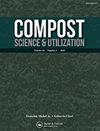Effect of Different Organic Fertilizers Application on Soil Organic Matter Properties
IF 0.9
4区 农林科学
Q3 ECOLOGY
引用次数: 13
Abstract
ABSTRACT The aim of this study was to investigate the effect of application of different organic fertilizers (general organic fertilizer, GOF; biogas residue, BR; refined organic fertilizer, ROF) as compared to no fertilizer on the composition of the soil organic matter. Different scales of experiment (sand filtration tube, pot, and field plot experiment) were conducted to study the effect of organic fertilizers. The results showed that application of organic fertilizer can significantly increase soil organic matter and improve its quality. The content of soil organic carbon and humus increased with the growing of fertilization within a certain range (0∼38 t ha−1). In sand filtration tube experiment, ROF can significantly increase the quality of humic acid (HA)/ fulvic acid (FA), while it had little effect on the quality of HA/FA in the pot and plot experiment. In the field plot experiment, application with mid-dosage (38 t ha−1) of ROF can improve total organic carbon (TOC), HA and FA (by 70%, 89%, and 74%, respectively) compared with the control, and it had the best effect of all. BR for its incomplete fermented, had the worst effect of all. Therefore, ROF with 38 t·ha−1 could be used as the optimal fertilization scheme for the purpose of improving soil organic carbon.不同有机肥施用对土壤有机质性质的影响
摘要本研究的目的是研究与不施肥相比,施用不同有机肥(普通有机肥GOF、沼渣BR、精制有机肥ROF)对土壤有机质组成的影响。采用不同规模的试验(砂滤管、盆栽和田间小区试验)研究了有机肥料的施用效果。结果表明,施用有机肥能显著增加土壤有机质,改善土壤质量。土壤有机碳和腐殖质含量在一定范围内(0~38t ha−1)随着施肥的增加而增加。在砂滤管实验中,ROF能显著提高腐殖酸(HA)/黄腐酸(FA)的质量,而在盆栽和小区实验中对HA/FA的质量影响不大。在田间小区试验中,中剂量(38t ha−1)施用ROF可使总有机碳(TOC)、ha和FA分别比对照提高70%、89%和74%,且效果最好。BR发酵不完全,效果最差。因此,38t·ha−1的ROF可以作为提高土壤有机碳的最佳施肥方案。
本文章由计算机程序翻译,如有差异,请以英文原文为准。
求助全文
约1分钟内获得全文
求助全文
来源期刊

Compost Science & Utilization
农林科学-生态学
CiteScore
4.10
自引率
0.00%
发文量
0
审稿时长
>36 weeks
期刊介绍:
4 issues per year
Compost Science & Utilization is currently abstracted/indexed in: CABI Agriculture & Environment Abstracts, CSA Biotechnology and Environmental Engineering Abstracts, EBSCOhost Abstracts, Elsevier Compendex and GEOBASE Abstracts, PubMed, ProQuest Science Abstracts, and Thomson Reuters Biological Abstracts and Science Citation Index
 求助内容:
求助内容: 应助结果提醒方式:
应助结果提醒方式:


